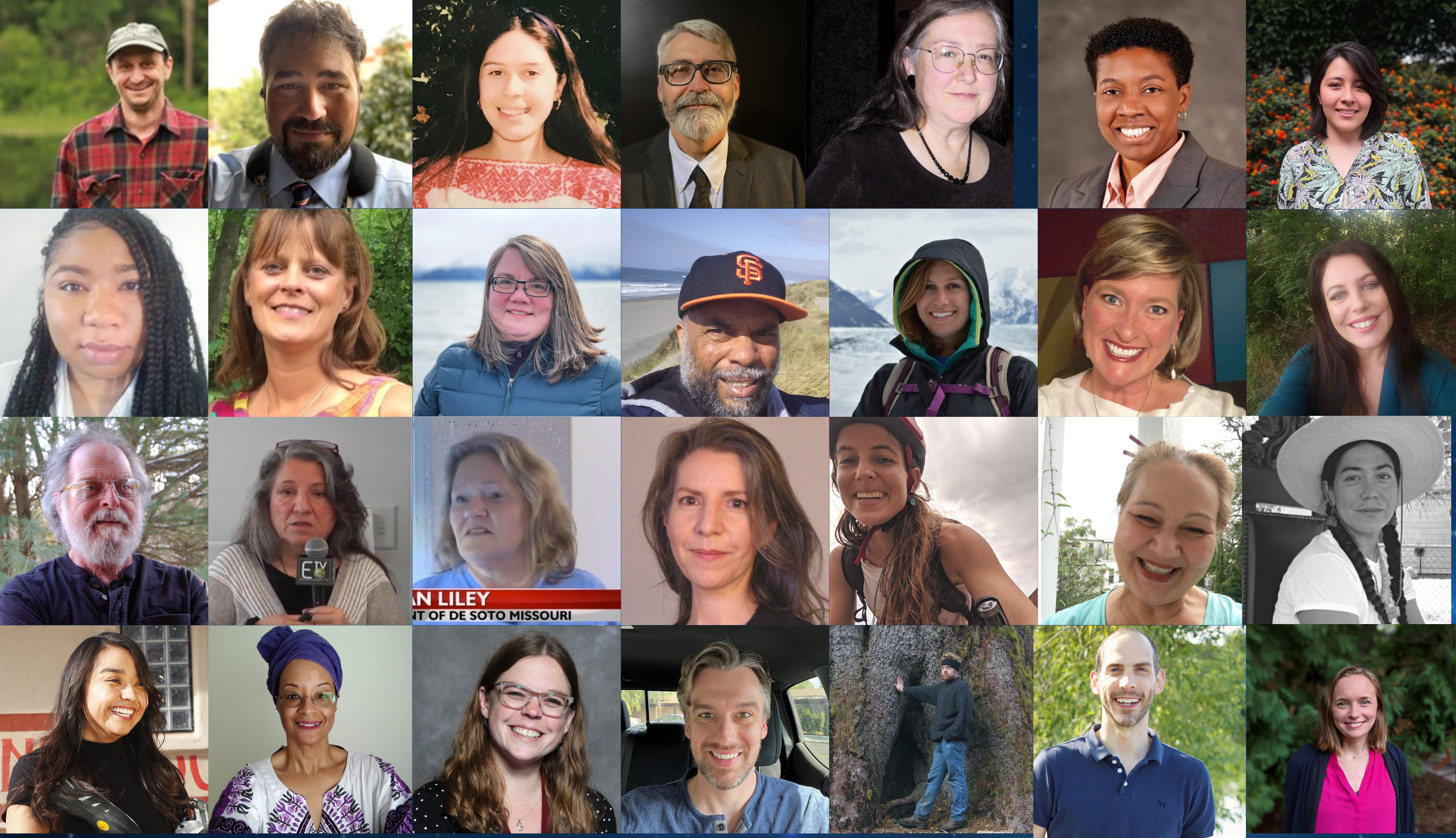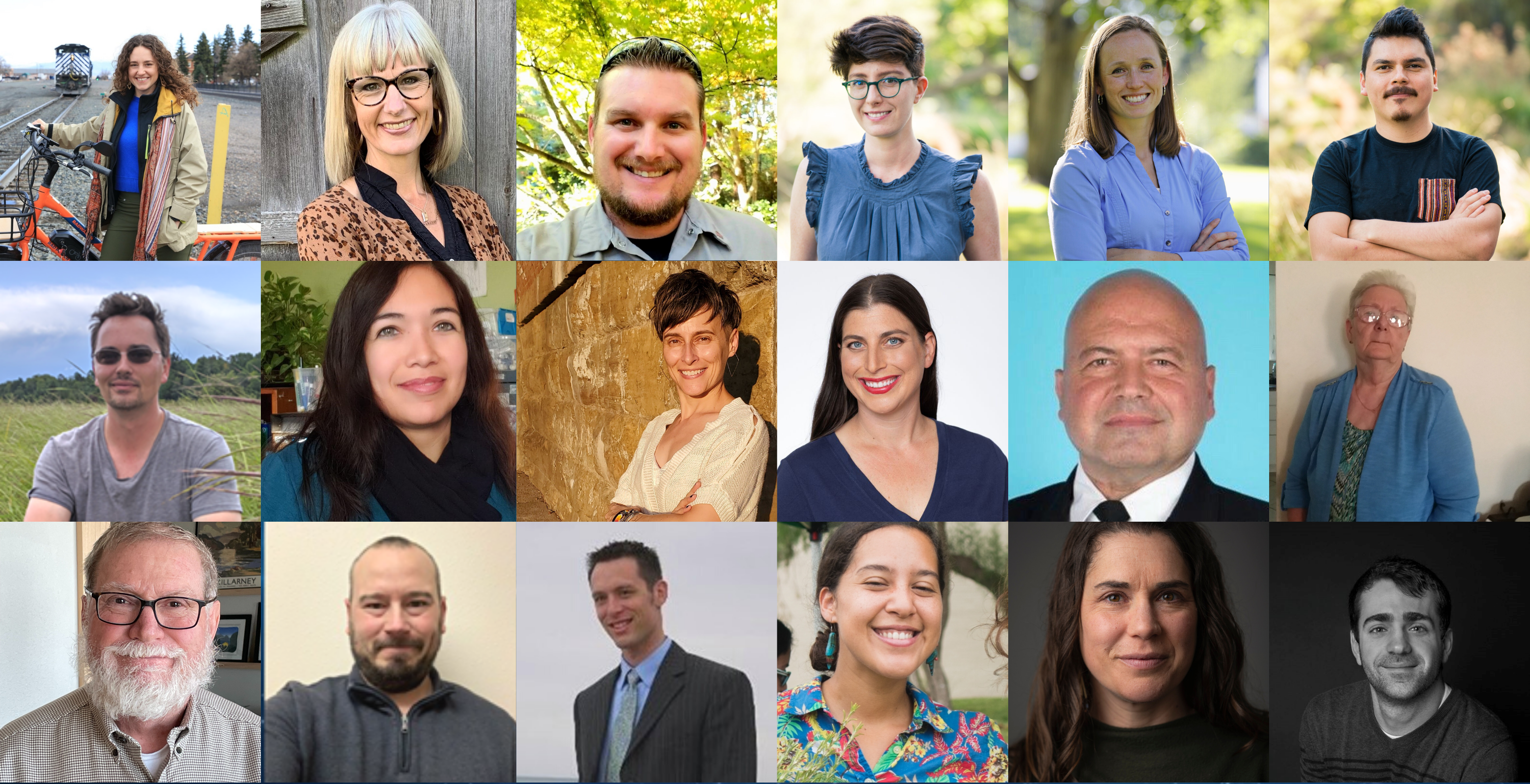
2022 was a year in which community science stepped beyond its origins as a somewhat radical “new approach” and emerged as an ever more central and respected part of the mainstream discourse about how to address the challenges of our time. With climate change, pollution and environmental degradation, and issues of disenfranchisement and marginalization increasingly top of mind for many people, community science has rapidly gained momentum on the national stage.
Amid this groundswell of energy, our staff, volunteers and partners have stepped up to share our experiences and offer insights to encourage the increasing visibility, recognition and support for community-led models of investigation and action. We have done this through active participation in a national and global discourse about community science, and through a steady flow of on-the-ground projects in local communities. The continuing success of our cohort model for efficient and effective project facilitation, while cultivating community science leaders through our Community Science Fellowship program, has allowed us to lead by example and foster community science across the United States and many other countries around the globe.
Our Projects
2022 saw the launch of 55 new projects in four cohorts — another record-breaking year for our program! Our teams completed 9 projects around the world while maintaining their focus on community priorities. Our community leaders held community forums around high-profile issues such as water quality, climate anxiety and economic and social stressors; distributed home water test kits; presented key findings about flood risks to local stakeholders; accounted for future precipitation changes in flood engineering design standards; and much more. Several projects closed with exciting plans for future activities to continue to foster conversation and drive action around these critical issues.
Projects launched in 2022
February
- Oakland, California: Developing a nature immersion internship program to improve mental health for Black youth
- Chicago, Illinois: Learning with the community: Co-creating an inclusive culture for climate migrants in Albany Park, Chicago
- Naoma, West Virginia: Mapping particulate plumes from mountaintop removal mining that involves high explosive blasting
- Fort Defiance, Arizona: Assessing illegal dumping sites in Fort Defiance, Arizona to raise community awareness and stimulate innovative solutions
- Cleveland, Ohio: Assessing barriers to testing children for lead
- Montgomery County, Pennsylvania: Improving climate-informed flooding mitigation and stormwater management planning
- LaPlace, Louisiana: Identifying green infrastructure solutions to build a resilient stormwater management system
- Hyattsville, Maryland: Designing stormwater solution plans and developing impactful action oriented initiatives
- Guilford County, North Carolina: Monitoring COVID-19 presence in wastewater at the sub-county level
- Reidsville, Georgia: Building trust in Reidsville, Georgia through residential green infrastructure
With additional project development in:
- Tyonek, Arkansas
- Whittier, California
- De Soto, Missouri
- Graniteville, New York
- Washington, DC
April
- City of La Crosse, Wisconsin: Developing strategies for mitigating heat islands in La Crosse, Wisconsin
- La Crosse, Wisconsin: Assessing scientific data to create safer playgrounds and community environments
- City of Madison, Wisconsin: Identifying opportunities for natural urban heat solutions
- Town of Peshtigo, Wisconsin: Applying to a federal funding program to finance a new water treatment facility to provide a residential water supply free of PFAS contamination.
- Beloit, Wisconsin: Investigating the potential air quality impacts of natural gas plant emissions on community health in Beloit, Wisconsin
- City of Sun Prairie, Wisconsin: Empowering green infrastructure & biodiversity on residential properties in Sun Prairie, Wisconsin
- Town of Campbell, Wisconsin: Investigating PFAS contamination in the Town of Campbell and French Island
- City of Abbotsford, Wisconsin: Assessing groundwater nitrate reduction realized by retiring cropland to community-serving land management
- Village of Norwalk, Wisconsin: Responding to increasing flood concerns through a coupled emergency action plan and warning system approach
- Vernon County, Wisconsin: Mitigating flooding from the ridge to the valley through strategic planning and demonstration
- Burnett County, Wisconsin: Predicting odor consequences of a large confinement hog-rearing operation
- City of Ashland, Wisconsin: Identifying solutions to rehabilitate the Bay City Creek riparian corridor and improve water quality in Lake Superior
- Village of Port Edwards, Wisconsin: Developing a total water quality assessment tool for community access
With additional project development in:
- Dane County, Wisconsin
July
- Adel, Georgia: RiskAware: Visualizing the environmental health risks in and near Adel, Georgia
- Baltimore, Maryland: Assessing and raising awareness of the risks associated with the proposed B&P Tunnel Replacement Program
- Houston, Texas: Examining the cumulative impacts of toxic flood waters and disaster vulnerability on the health of communities in Northeast Houston, Texas
- Corpus Christi, Texas: Towards a self-sustaining community: Assessing soil health in the Corpus Christi community to inform community agriculture and gardening strategies through a comprehensive soil monitoring system and the potential need for natural soil remediation techniques
- Pascagoula, Mississippi: Assessing industrial pollution and health impacts in Pascagoula, Mississippi to assist in buyout efforts
- Santa Cruz, California: Improving community visualizations of existing climate actions and improve participation in, and access to, existing climate actions
- Tacoma, Washington: Updating South Tacoma aquifer code and land use practices
- Mexico City, Mexico: Institutionalizing a community of practice in Mexico committed to best communication approaches for conservation and socio-environmental justice efforts
With additional project development in:
- New Castle County and Sussex County, Delaware
- Sawyers, Jamaica
- Lucerne Valley, California
- New Haven, Connecticut
- Birmingham, Alabama
- Black Belt of Alabama
- Bunker Hill, Jamaica
- Anchorage, Alaska
October
Projects being developed in:
- City of Talent, Oregon
- Livingston, Montana
- Bucksport, South Carolina
- Omaha, Nebraska
- Socially Responsible Agriculture Project
- Trelawny, Jamaica
- Milton, Florida
- City of Nashville, Tennessee
- South Decatur, Georgia
- City of Olympia, Washington
Projects completed in 2022
Nine projects came to a close this year after making valuable contributions to community priorities such as infrastructure, flooding, pollution, and climate mitigation and impacts. We applaud their hard work!
- Anchorage, Alaska: Updating greenhouse gas emission inventory and framework
- Costa Mesa, California: Raising awareness of climate change’s impact on human health
- San Juan Basin, Colorado: A values-focused approach for community conversations about the economy, environment and well-being
- Glastonbury, Connecticut: Addressing the public health effect of well water contamination by naturally occurring uranium
- Northern Virginia, Virginia: Planning climate resilient stormwater infrastructure for a growing region
- Santa Rosa County, Florida: Mapping natural and developed resources to positively impact responsible growth
- Helena Island, South Carolina: Assessing the health impacts of increased urban sprawl in Beaufort County, South Carolina due to water contamination
- Takoma Park, Maryland: Assessing how to prioritize stormwater infrastructure projects under a changing climate
Our Community
Our community of volunteers, staff and board members, and collaborators expanded this year to include a diverse and incredibly devoted array of individuals and organizations from around the world.
We are grateful for the invaluable leadership of our Advisory Board, the dedication of our staff, and the incredible network of volunteers and partners who drive meaningful impacts in local communities through their compassion, expertise and hard work. The Gordon and Betty Moore Foundation and National Science Foundation provided funding support for project cohorts and community grants, making it possible for more communities to thrive.
Community Science Fellows for projects launched in 2022


We welcomed volunteer project coordinators in four cohorts:
- February Community Science Fellows
- April Community Science Fellows
- July Community Science Fellows
- October Community Science Fellows
Community Leads for projects launched in 2022


We welcomed community leads in four cohorts:
Collaborators active in 2022
We have been honored to continue working with many longtime collaborators while welcoming new organizations into our network, including:
- American Meteorological Society
- University of Wisconsin UniverCity Year
- Environmental Protection Network
- Anthropocene Alliance
- National Park Service
- ICLEI USA – Local Governments for Sustainability
- Association of Science and Technology Centers
- Community and College Partners Program
- National Ecological Observatory Network
- American Bar Association Section on Energy, Environment & Resources
- American Planning Association
- Government Finance Officers Association
- International City/County Management Association
Our Impact
The impacts of Thriving Earth Exchange are felt most immediately in the communities we support: by new connections among diverse stakeholders, through new knowledge about our world and the challenges communities face, with decisions that are informed by evidence and with actions that strive to make the world a better place. To complement and enhance these on-the-ground impacts of our community science projects, we also work at a broader scale to advance inclusive, community-first models of learning and engaging across other organizations and communities of practice.
Enhancing the visibility of community science
Many of our activities this year reflected a substantially increased level of visibility of and engagement with community science across AGU as a whole and in the broader scientific and policy communities.
We were honored to contribute to a variety of efforts to bring community science into the mainstream, including:
- Hosting a workshop that convened over 200 community representatives, academics, non-profit leaders and participants in community science to discuss suggestions for why and how the National Science Foundation should launch a new track on Community Science, Citizen Science, and Community Resilience
- Sharing insights about community partnerships with technical experts with over 400 attendees at “Justice40 and Technical Assistance Providers,” a special event hosted by the White House Council on Environmental Quality
- Development of a justice-focused community science course for capacity building in communities around the world
Cultivating platforms for exchange

NASEM Fishbowl – Screenshot from NASEM video of event
Our network has proved eager to discuss challenges, successes and creative approaches to advancing community science. This year saw lively engagement on existing and new platforms for exchange, including:
- The Community Science Exchange, which features a hub for sharing resources on community science along with a peer-reviewed, open-access journal, Community Science
- A “fishbowl” conversation on “What does equitable co-production look like in practice?” run by Thriving Earth staff as part of a workshop hosted by the National Academies of Sciences, Engineering, and Medicine
- The Global Community Science WhatsApp group, which now includes over 50 members who use the platform to exchange experiences and build community science capacity globally
- Regular webinars and discussion forums for community leads, global partners and other groups engaged in advancing community science
Sharing stories
The individuals, communities and organizations we work with have incredible stories to share —stories of frustration, hope, passion and persistence. Their work has attracted attention to important issues and provoked dialogue across multiple communities.
Here are a few highlights of stories shared this year:
- The U.S. Department of Commerce awarded a $1.9 million grant to support the growth of tourism in Boulder City, Nevada. At the project’s heart is a sweeping effort to reduce light pollution and capitalize on the community’s exceptional night skies, informed by a lighting management plan developed through a community science project.
- A project team in Santa Rosa County, Florida is empowering residents with a mapping tool to track how local flooding and water contamination issues intersect with proposed and ongoing development, helping residents get the data they need to influence responsible rulemaking.
- The U.S. Environmental Protection Agency awarded nearly $500,000 to FracTracker Alliance in the mid-Ohio River Valley, expanding upon the team’s Thriving Earth Exchange project to assess pollution associated with unconventional oil and gas development.
- A project team in Ottawa County, Oklahoma drew attention to the impacts of toxic floodwaters in their community, including a feature story by National Public Radio station KOSU. A grant from the Gordon and Betty Moore Foundation helped the community leads craft their communication and outreach activities for greatest impact.
- Numerous Thriving Earth Projects have recently been cited in the scholarly literature, helping to illustrate the potential and demonstrated impacts of the community science model. These include papers in Frontiers in Climate, Environmental Research Letters, Climate Change, GeoHealth and Biological Conservation, as well as mentions in books published by Routledge and the University of Arizona Press.
